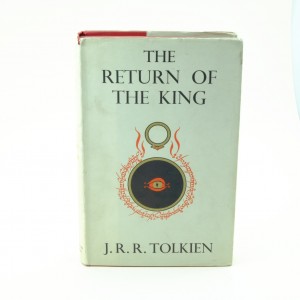Rare and Antique Books hold some of Tolkien’s most famous and rare first edition novels – the Hobbit and The Lord of the Rings. These fantasy stories are not written purely from Tolkien’s imagination – here are some of the biographical and historical influences to his writing.
The Impacts of War: Tolkien reluctantly enlisted into the Army in 1915. He was ordered to France where he helped capture the German stronghold at Ovillers, two weeks after the first Somme assault. At the time he comments “It was like death”, yet he witnessed courage and reliance which was expressed as a perpetual conflict between good and evil in his fantasy battles in Middle Earth. Of The Lord of the Rings he comments, “But I should say, if asked, the tale is not really about Power and Dominion: that only sets the wheels going; it is about Death and the desire for deathlessness. Which is hardly more than to say it is a tale written by a Man!” Humphrey Carpenter ed. (1981) The Letters of J.R.R.Tolkien
Romantic Influences: J.R.R.Tolkien married Edith Bratt in 1916 and their relationship was a source of inspiration for Tolkien’s writings. The separation of Beren and Lutherin mirrored their own time apart during the First World War. A walk in the woods with his wife Edith in 1917 inspired the love story of the fugitive warrior Beren and the elven-fair Lúthien – their names are even on the Tolkien’s Oxford gravestone. Following Edith’s death, Tolkien wrote the following in a letter to their son Christopher. “I never called Edith Luthien – but she was the source of the story that in time became the chief part of the Silmarillion. It was first conceived in a small woodland glade filled with hemlocks at Roos in Yorkshire (where I was for a brief time in command of an outpost of the Humber Garrison in 1917, and she was able to live with me for a while)” Letters of J.R.R. Tolkien, Letter 340, To Christopher Tolkien.
The Experience of Loss: Tolkien was orphaned at an early age. His father, Arthur, died when he was only 3 years old and his mother, Mabel, died from diabetes eight years later. Tolkien and his siblings were fostered by Father Francis Murray of the Roman Catholic Church. Several characters in his novels experience the loss of a loved one. Feanor, Prince of the Noldor, first loses his father and then his greatest conceptions, the Silmarils, through the conspiracies of the wicked Morgoth. The Return of the King explains how, after more than two hundred years of life, Aragorn dies leaving behind a sad and now-mortal Arwen. She then returns to one of the few places of pure happiness she knew in her life to die peacefully by the river, Nimrodel.
Tolkien Loved Languages: Tolkien was a professor philologist of ancient Germanic Languages specialising in Old English. His love of the Finnish Language led to the constructed of the Elvish language in his stories, such as Khuzdul the tongue of the Dwarves, and the Black Speech used by Sauon in the Second Age. Tolkien used Old Norse names for the Dwarves, but the name of Bilbos’s home was inspired in a more concrete manner – by his Aunt’s Farm, Bag End.
Languages specialising in Old English. His love of the Finnish Language led to the constructed of the Elvish language in his stories, such as Khuzdul the tongue of the Dwarves, and the Black Speech used by Sauon in the Second Age. Tolkien used Old Norse names for the Dwarves, but the name of Bilbos’s home was inspired in a more concrete manner – by his Aunt’s Farm, Bag End.
Influences on Publication: After the success of the Hobbit, his publishers, Allen and Unwin, requested a sequel  novel- Tolkien obliged with a 200,000 word script written in 1949. However, Tolkien wrote complicated and lengthy scripts with detailed appendices, edits, and maps which inevitably created a delay in publication. Paper costs rocketed in The Second World War also affecting publication. As a result Tolkien’s Lord of the Rings novel was redrafted into three separate books. The first of these books, The Fellowship of the Ring, was finally published in July 1954. This was followed by The Two Towers later the same year and then The Return of the King in October 1955 – a long publication journey indeed!
novel- Tolkien obliged with a 200,000 word script written in 1949. However, Tolkien wrote complicated and lengthy scripts with detailed appendices, edits, and maps which inevitably created a delay in publication. Paper costs rocketed in The Second World War also affecting publication. As a result Tolkien’s Lord of the Rings novel was redrafted into three separate books. The first of these books, The Fellowship of the Ring, was finally published in July 1954. This was followed by The Two Towers later the same year and then The Return of the King in October 1955 – a long publication journey indeed!
J.R.R. Tolkien’s books are complex and intelligent works of imagination –and our blog only retells a fraction of the influences upon his writing. Holding and reading the first edition of these wonderful books gives a real thrill of excitement knowing you are in possession of a classic!
See our Tolkien books – Lord of the Rings The Hobbit The Return of the King

